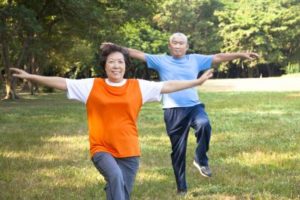
Each year, more than 2 million older Americans go to the emergency room because of fall-related injuries. A simple fall can cause a serious fracture of the arm, hand, ankle, or hip.
But don’t let a fear of falling keep you from exercising and being physically active. Overcoming this fear can help you stay active, maintain your physical health, and prevent future falls. The good news is that there are simple ways you can prevent most falls.
One of the most important ways to prevent falls is to stay physically active. Regular exercise makes you stronger. Weight-bearing activities, such as walking or climbing stairs, may slow bone loss from osteoporosis. Lower-body strength exercises and balance exercises can help you prevent falls and avoid the disability that may result from falling.
Balance exercises can help you prevent falls and avoid the disability that may result from falling. You can do balance exercises almost anytime, anywhere, and as often as you like, as long as you have something sturdy nearby to hold on to for support.
Try these balance exercises: stand on one foot, walk heel to toe, and walk in a straight line with one foot in front of the other. A number of lower-body strength exercises—especially those that strengthen your legs and ankles—also can help improve your balance. These include the back leg raise, side leg raise, knee curl, and toe stand exercises.
In the beginning, using a chair or the wall for support will help you work on your balance safely.
More Fall Prevention Tips
Have your eyes and hearing tested often. Always wear your glasses when you need them. If you have a hearing aid, be sure it fits well, and wear it.
Find out about the side effects of any medicine you take. If a drug makes you sleepy or dizzy, tell your doctor or pharmacist.
Get enough sleep. If you’re sleepy, you’re more likely to fall.
Limit the amount of alcohol you drink. Even a small amount can affect balance and reflexes.
Stand up slowly after eating, lying down, or sitting. Getting up too quickly can cause your blood pressure to drop, which can make you feel faint.
Wear rubber-soled, low-heeled shoes that fully support your feet. Wearing only socks or shoes/slippers with smooth soles on stairs or floors without carpet can be unsafe.
